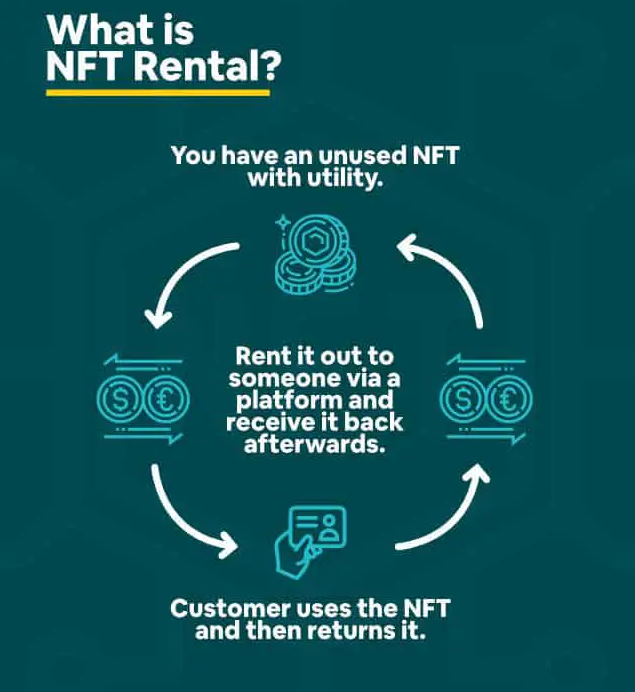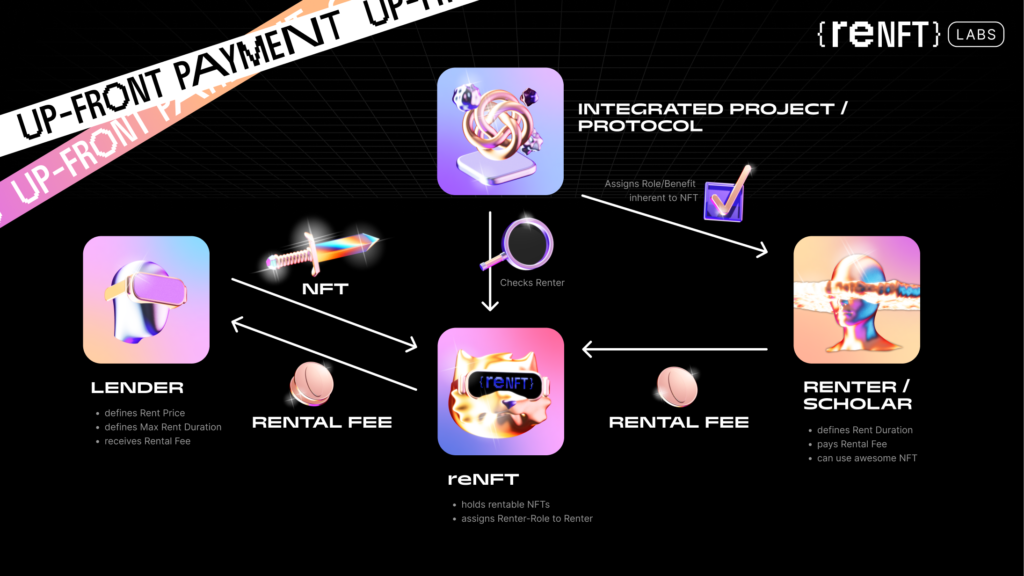What You Should Know About NFT Rentals
There has been a substantial upheaval in the decentralized arena with the introduction of non-fungible coins. It expands and redefines the concept of a decentralized economy, develops new applications for blockchain technology, and supports the transparency and permissionlessness of the technology. The financial and investment prospects that continue to draw investors and fans are one of its greatest potentials.
Investors have not yet thoroughly examined and taken advantage of the variety of financial opportunities provided by NFTs. Despite being around since 2014, NFTs didn’t become widely used until 2017 and went through an adoption frenzy in 2021. About $41 billion worth of bitcoin was spent on NFTs during this time. As additional NFT initiatives are implemented, it is anticipated that this number will increase dramatically.
Unfortunately, buying NFTs is expensive; getting your hands on these glitzy digital tokens frequently costs a small fortune. This has inspired investors, innovators, and developers to introduce innovative solutions that could lower the cost of NFTs for everyone. One of these tactics entails renting NFT.
Describe NFT Rental.
The owner of a specific NFT may rent it to a borrower through the NFT rental service, which offers short-term rentals. Due to the short rental period, this innovative technique enables borrowers to experience the usefulness of such NFT. In order to allow rentals and ensure that the rented NFT is returned to its rightful owner when the rental term has ended, NFT rental is not a feature that is common across all marketplaces. Instead, it is unique to platforms that use similar protocols to DeFi.

NFT Rentals: All the Information You Need
Why must I lease an NFT?
Although renting an NFT might seem unnecessary, the potential of some digital assets makes it intriguing and important. Renting out NFTs is a means to make money off of them as a lender, basically opening up a new channel for passive income on otherwise idle digital assets.
Different Rental Protocols
Renting an NFT incurs fees at an agreed-upon rate, just like DeFi lending schemes when cryptocurrencies are borrowed. There are two categories of NFT rentals, namely:
Collateralized Rental – When the borrower deposits a predetermined amount of collateral to secure the NFT, this is known as collateralized NFT rental. In the event that a loss occurs, this compensates for it and shields the owner.
Non-collateralized rental – Since no collateral is deposited and owners of NFTs are not required to surrender their digital assets, non-collateralized rental seems to be more uncomplicated and risk-free for the owner. Instead, provide the renter a wrapped token that is backed by the particular NFT that was produced. When returned, this bundled NFT will be burned.
NFT Rental’s Operation
A smart contract that controls the entire rental protocol controls all transactions once the predetermined conditions are satisfied.
Owners of NFTs must list their NFTs on rental-friendly marketplaces in order to use collateralized rents. The borrowing process will then be started when interested parties have explored the pool of available loans. The mentioned NFT will be locked in a smart contract together with its contract’s rules once this borrowing process is initiated.

The regulations of the contract specify the length of the rental, the security deposit, and other terms and conditions. Once all parties have agreed, the smart contract will go into effect and provide the borrower the NFT. Once the predefined expiry date or time has passed, the smart contract also returns the NFT to the owner and the collateral to the borrower.
The process is the same for non-collateralized rentals as it is for their collateralized equivalent, but there is an additional choice. Non-collateralized rentals have a special option that involves not providing the original NFT to the borrower because there is no collateral to fall back on or take care of hazards. Instead, the smart contract creates and gives the borrower a wrapped NFT that is backed by the specific NFT that is available for rent. The wrapped asset is deposited into the smart contract, which burns it after the expiration date and time clocks. Several NFT ecosystems have also implemented internal rental systems where they are responsible for managing the lent assets.
It is important to note that the borrowers in both transactions make rental payments. As determined by the network where the transaction takes place, both parties will also be liable for their respective transaction fees.
As a borrower, renting an NFT enables you to utilize a number of its features. For instance, if you rent NFTs that produce tokens or collectibles that can be sold as NFTs, everything they produce may be yours if the smart contract for the renting specifies that it will. Additionally, as a borrower, renting NFTs like BAYC and other neighborhood-focused NFTs gives you access to each community during the rental time. As a result, NFT rental is a priceless way for lenders to profit and a unique way for borrowers to benefit from and experience NFT utilities.

Everything You Need to Know About NFT Rentals
What are the available prospective NFTs?
Following are some instances or classes of NFTs that can be rented for various uses by hobbyists or investors who cannot afford some NFTs.
Metaverse Lands – Metaverse lands are utilitarian NFTs with a variety of economic possibilities that let outside developers create structures and experiences. Such properties can be rented by borrowers to hold events like social gatherings, concerts, and galas. Users can also construct Metaverse lands with auditoriums for meetings, symposiums, or retail establishments. Additionally, it can be rented out to businesses looking for booths or points of sale at renowned Metaverse events.
Avatar rentals are available to enthusiasts who want to attend Metaverse events since avatars act as human personalities in the virtual world. Avatars are just one aspect of digital arts; they also comprise unique drawings and photographs. In the Metaverse, event venues can be decorated with these digital arts by renting them.
Play-to-earn (P2E) games allow players to acquire in-game collectibles as a reward for passing various levels and stages. Players can use these collectibles, such as apparel, tools, or potions, to advance in the game. Additionally, particularly with exotic equipment like guns, swords, daggers, and armor, they can be rented out to other players who want to utilize them to win a level in their own gaming experience.
NFTs in the fields of music and art – Music is another major NFT market. Music artists release their music videos and audio as NFTs, and others who cannot pay them can rent these NFTs. Users who want to explore real-world use cases can also rent specialized NFTs with real-world utilities, such as the VeeFriend collections, in the case of art NFTs.

Where can I get NFT rentals?
NFT rental is available on numerous marketplaces; major ones and their compatible networks include
IQ Procedure (compatible with Polygon and BNB networks)
Vera (compatible with Ethereum, Polygon, Solana, and BNB networks) (compatible with Ethereum, Polygon, Solana, and BNB networks)
Defy (compatible with Polygon and BNB networks) (compatible with Polygon and BNB networks)
Protocol Trava (compatible with BNB smart chain)
Darkblocks (compatible with Ethereum, Solana, polygon, Avalanche, and Tezos) (compatible with Ethereum, Solana, polygon, Avalanche, and Tezos)
ReNFT (compatible with Ethereum, Polygon, Solana, and Avalanche networks) (compatible with Ethereum, Polygon, Solana, and Avalanche networks)
Zharta (compatible with the Ethereum blockchain) (compatible with the Ethereum blockchain)
Renfta (compatible with Skale network) (compatible with Skale network)
Conclusion
Another tactical idea that enhances the usefulness of all NFTs is NFT renting. It enables NFT owners to lend out their unused NFTs to interested investors or customers who want to use them. Apart from providing NFT owners with passive income, renting fosters P2P interactions and creates channels for collaboration. It broadens the market for NFTs and boosts their economy.